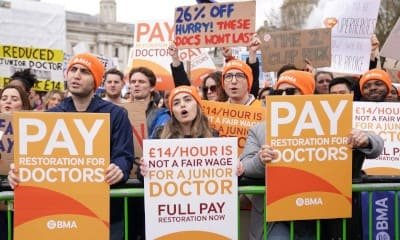Report by Kamgar Ekta Committee (KEC) correspondent

Tens of thousands of junior doctors of Britain’s National Health Service have been a five-day strike from 13 July. It is reported to be the longest strike in the history of UK’s health system.
Junior doctors make up around half of all hospital doctors in England. The doctors’ union British Medical Association (BMA) which represents more than 46,000 junior doctors in the UK, had asked for a 35 percent pay rise to bring junior doctors’ pay back to 2008 levels after taking inflation into account. Junior Doctors have pointed out that inflation has reduced the effective value of the pay they receive. Junior doctors’ inflation-adjusted pay has fallen by 26% since 2008.
“A crippling cost-of-living crisis, burnout and well below inflation pay rises risk driving hard-working doctors out of their profession at a time when we need them more than ever. To protect the NHS, the Government must engage and address doctors’ concerns,” the BMA has said. Further, it stated that the NHS suffers from systemic issues, such as a lack of funding, chronic understaffing, poor retention, falling number of beds for patients and long waiting lists for the patients.
The government offered a 6 percent pay rise only. The government’s offer not only did not address pay erosion over the last 15 years, it did not even match inflation this year. Britain’s inflation rate has been high for well over a year and was 8.7% in May – the highest of all major developed economies.
This is the fourth strike by doctors. Earlier, on 14th June, nearly 50,000 junior doctors had struck work over the same demand. That strike was for 72 hours and part of a united and continued agitation of all health workers against the fall in their wages and for better working conditions.
In April and May also the doctors struck work, but each time the government refused to negotiate with them and made paltry offers. In 2022, the government had offered to all health workers pay increase of around 3.5% only, again well below inflation.

The government, like every time, lost no time in maligning the striking doctors and provoking the public against the striking doctors. It declared that “a pay demand of 35% risks fuelling inflation, which makes everyone poorer.”
This is an outright lie. Inflation is not stoked by higher wages; on the other hand, workers are compelled to demand higher wages to be able to face rising prices of all goods and services.
Working people recognise the genuineness of the pay concerns of health workers and they see that the government does not pay any heed to them. The recent strikes of nurses in the Royal College of Nursing, the ambulance staff in various government hospitals and of junior doctors have steadily gained support from working people across the country.

